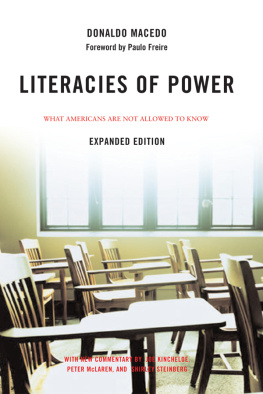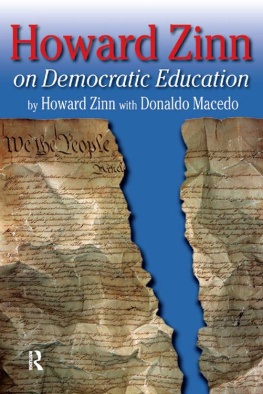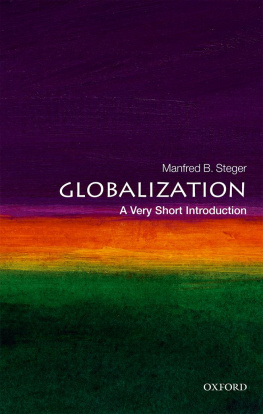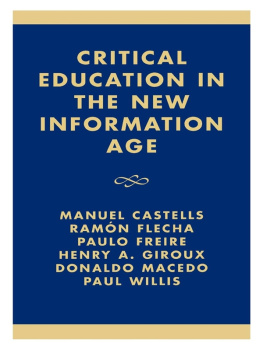THE GLOBALIZATION OF RACISM
Series in Critical Narrative
Edited by Donaldo Macedo
University of Massachusetts Boston
Now in print
The Hegemony of English
by Donaldo Macedo, Bessie Dendrinos, and Panayota Gounari (2003)
Letters from Lexington: Reflections on Propaganda
New Updated Edition
by Noam Chomsky (2004)
Pedogogy of Indignation
by Paulo Freire (2004)
Howard Zinn on Democratic Education
by Howard Zinn with Donaldo Macedo (2005)
How Children Learn: Getting Beyond the Deficit Myth
by Terese Fayden (2005)
The Globalization of Racism
edited by Donaldo Macedo and Panayota Gounari (2005)
Forthcoming in the series
Science, Truth, and Ideology
by Stanley Aronowitz (2006)
Pedogogy of Dreaming
by Paulo Freire (2006)
Dear Paulo: Letters from Teachers
by Sonia Nieto (2006)
THE GLOBALIZATION OF RACISM
EDITED BY
DONALDO MACEDO
AND
PANAYOTA GOUNARI
To those willing to rupture from the racist form of charitable racism and who are reborn with the conviction to struggle to recapture our endangered humanity.
First published 2006 by Paradigm Publishers
Published 2016 by Routledge
2 Park Square, Milton Park, Abingdon, Oxon OX14 4RN
711 Third Avenue, New York, NY 10017, USA
Routledge is an imprint of the Taylor & Francis Group, an informa business
Copyright 2006 , Taylor & Francis.
All rights reserved. No part of this book may be reprinted or reproduced or utilised in any form or by any electronic, mechanical, or other means, now known or hereafter invented, including photocopying and recording, or in any information storage or retrieval system, without permission in writing from the publishers.
Notice:
Product or corporate names may be trademarks or registered trademarks, and are used only for identification and explanation without intent to infringe.
Library of Congress Cataloging-in-Publication Data
Macedo, Donaldo P. (Donaldo Pereira), 1950-
The globalization of racism / edited by Donaldo Macedo and Panayota Gounari.
p. cm. (Series in critical narrative)
Includes bibliographical references and index.
ISBN 1-59451-076-8 (hardcover : alk. paper) ISBN 1-59451-077-6 (paperback : alk. paper)
1. Racism. 2. Xenophobia. 3. Globalization. I. Gounari, Panayota. II. Title. III. Series.
HT1521.M225 2005
305.8dc22
2005016133
Designed and Typeset by Straight Creek Bookmakers.
ISBN 13 : 978-1-59451-076-2 (hbk)
ISBN 13 : 978-1-59451-077-9 (pbk)
CONTENTS
Donaldo Macedo and Panayota Gounari
Zygmunt Bauman
Edward Said
David Theo Goldberg
Henry A. Giroux
Loc Wacquant
Kathleen Christison and Bill Christison
Anja Weiss
Carmel Borg and Peter Mayo
Anna Aluffi Pentini and Walter Lorenz
Peter Gstettner
Georgios Tsiakalos
Franz Hamburger
Ramn Flecha, Lena de Botton, Iaki Santa Cruz, and Julio Vargas Clavera
Joo Menelau Paraskeva
THE GLOBALIZATION OF RACISM
Donaldo Macedo and Panayota Gounari
Through the process of dehistoricizing race and, by implication, racism, the dominant ideology gives rise to a fertile terrain that confuses the meaning of race and enables conservatives as well as some liberal scholars to claim the end of racism. By dominant ideology we refer to the organizing principles that generate, shape, and sustain white supremacy designed to exclude other human beings by virtue of their race, language, culture, and ethnicity so they can be exploited. In the United States, for example, writers such as Dinesh DSouza who falsely claim the end of racism, despite overwhelming evidence to the contrary, are handsomely rewarded. This evidence ranges from the growing number of racial incidents on college campuses to the burning of synagogues and black churches to the proliferation of racist radio talk shows, whose hosts advocate killing Muslims in the name of patriotism.
The proposition that we have achieved the end of racism attempts to close down any space in which to question racism and the structures that produce and sustain it. In addition, this false proposition is intended to block all forms of interrogation concerning our understanding of race and racism while impeding clear analyses of these categories. The closing-down of the field of interpretation for racism has the consequence of dehistoricizing the term and its discourses and material practices. Through this dehistoricizing, racism is often disarticulated from politics and the ensuing political projects that crystallize subjectivities, agency and democratization. Individuals who embrace a dehistoricization process in their treatment of racism fail to recognize that racism is always historically specific and that it manifests itself differently in terms of geographical, cultural, ideological and material location, as accurately demonstrated by Loc Wacquants analysis of racism in the United States in
Gilroy correctly observes that historicality is a modern notion in that it presupposes a politics of time: making connections between ontology, nationality and theories of racial difference. It is associated with not only the idea of authenticity and the national principle but also, the elevation of race to a determining position in theories of history, especially those that pronounce on war and conflict, naturalizing them in the convenient idea of specifically race-based imperial conflict.2 Since historicality plays a fundamental role in the construction of the reality of race in the first place, we must look at the ways in which racism has and is currently manifested. Through a historical framework, it becomes much easier to adhere to David Theo Goldbergs notion that if race is a conception, then racism is a condition; or more precisely, where race is a set of conceptions, racisms are sets of conditions, and conditions are never realized outside of history.3 It is through history that we can more accurately identify the structures that shape and promote the dominant feature of racist expression, which is, according to Goldberg, exclusion.4 Hence racisms invariably involve promoting exclusions; consequently, any rigorous analysis must view racisms as phenomena of exclusion articulated on different levels and loci that either complement or clash with each other, constructing an arena where the diverse geographic, material, ideological and discursive elements coexist and are open to interpretation and analysis. Again, Goldbergs insights are illuminating: racisms assume their particular characters, they are exacerbated, and they have different entailments and ramifications in relation to specific considerations of class constitution, gender, national identity, region and political structure.5 By dehistoricizing the spaces that racism has occupied and is still occupying both imaginatively and materially, we are forced to embrace a depoliticized notion of race while remaining trapped in a field in which political interaction has been banished. The end of racism inaugurates a depoliticized space devoid of debate over meanings and institutionsa space where entailments and ramifications are simply terminated so as not to awaken dangerous memories or provoke uncomfortable discussions. That is why the topic of racism is usually labeled controversial, a characterization that discourages debate or discussion. Meanwhile, racial antagonisms remain present in shaping and reproducing the racialized discourses and practices.














![Macedo - Redis cookbook: [Practical techniques for fast data manipulation]](/uploads/posts/book/137932/thumbs/macedo-redis-cookbook-practical-techniques-for.jpg)